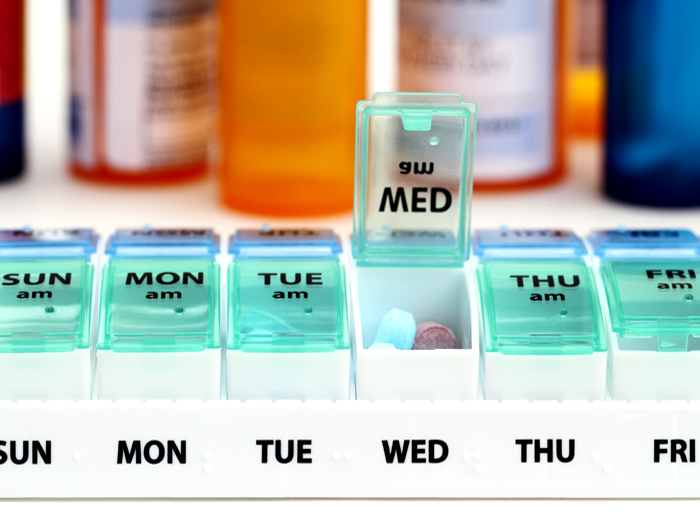12 Clever Ways to Remember Your Medications
Never miss a dose with these tried-and-true tips from doctors, pharmacists, nurses, and SilverSneakers community members.

When it comes to taking medication, everyone makes mistakes. Chances are you’ve skipped a dose, taken two by mistake, or accidentally popped a pill with breakfast that you’re supposed to swallow before bed.
The results of these slipups are usually pretty minor—maybe a little digestive distress—but in certain cases they can seriously jeopardize your health or even put your life in danger.
As you get older, properly managing medications becomes more of a challenge. Your memory may not be as good as it used to be. Plus, you’re probably taking more drugs than you did when you were younger; nearly half of people on Medicare take five or more meds (find prescription saving here). More pills means more potential mix-ups.
You need a plan of attack, or at least some simple tricks to stay on track. To help, we asked doctors, pharmacists, nurses, and SilverSneakers community members (join us on Facebook!) for the foolproof methods that work for them. Read on for their top tips.
Get and stay fit with SilverSneakers! Classes and events are happening right now at participating gyms, online through SilverSneakers LIVE, and at community centers near you. Activate your free online account to get started.
1. Plan 7 Days at a Time
“Organize your medications every Sunday for the whole week ahead,” says Tania Dempsey, M.D., founder of Armonk Integrative Medicine. “I suggest using pillboxes that allow you to arrange everything either by day or by different dosages per day. If all your pills are in one place, it will be easier than having to open multiple bottles throughout the day.”
2. Use Simple Cues
“If there are certain medications you need to take in the morning, keep your a.m. meds by your toothbrush,” says Jennifer L. FitzPatrick, M.S.W., author of Cruising Through Caregiving: Reducing the Stress of Caring for Your Loved One. “Put your evening medication by your night cream.”
3. Sort Them by Time of Day
“I have two seven-day pill boxes,” says SilverSneakers community member Marsha K. One has a.m. and p.m. on it, and she keeps it on her nightstand for medications she takes first thing in the morning or before bed. “The other is in my purse for afternoon pills so they are with me if I go out,” she says.
4. Set a Recurring Alarm
“Set your cellphone alarm to remind you to take pills at specific times,” says Shilpi Agarwal, M.D., family medicine doctor at One Medical in Washington, D.C.
5. Flip the Scripts
“On a busy day, I sometimes forget if I took a certain pill,” says SilverSneakers community member Mary S. “Now I turn each bottle upside down as I take my meds. The next day, I turn the bottles right side up. It works for me!”
6. Do It Together
“If you are married or coupled up and both taking medicines, make it a routine to take your a.m. and p.m. medications together,” FitzPatrick suggests.
7. Pair It with Pet Care
“First thing in the morning, I feed my three cats—they cry until I do—and then take two of my pills. About an hour later, I have my coffee and take some more meds,” says SilverSneakers community member Krystyna G. “In the afternoon, I feed the furballs their second meal and take two more meds. I take three more pills before bedtime, and I’m done!”
Subscribe to our newsletter
It's quick and easy. You could be one of the 13 million people who are eligible.
Already a member? Click to discover our 15,000+ participating locations.
Follow Us
8. Check ’Em as You Take ’Em
“Draw a box on your wall calendar for each of your medications and doses, and put a check mark in each as you take them,” suggests Kathy Quan, R.N., editor-in-chief of HomeHealth101.com.
9. Go High-Tech
“I like the Lively Safety Watch,” FitzPatrick says. “You wear it on your wrist, and it offers medication reminders as well as step counting, emergency calls, and other features.”
10. Add a Pop of Color
“Sticky notes or tent cards placed strategically around the house—such as on the refrigerator and medicine cabinet and next to meal settings—can be good reminders,” Quan says. “Use bright-colored papers, and remember to change them often. Otherwise, you’ll start to ignore them after a while.”
11. Upgrade Your Alarm Clock
“I use a Your Minder talking clock,” says SilverSneakers community member Doug L. “You record the message you want and can set it to go off up to six times per day. It’s very annoying, because it won’t stop until you hit the button. But it works well.”
12. Enlist Extra Help
“If you have complex medical issues—maybe you’re on 10 or more daily medications or were recently sent home from the hospital—I recommend having a home health nurse come do an assessment, part of which will entail working with you to develop a plan to ensure medication adherence,” says Steve Landers, M.D., president and CEO of VNA Health Group in New Jersey.
“I also think seniors in these situations should consider special medication packaging systems, such as the one provided by ExactCare. They make it easier to remember medications because the pills are placed into packets that are specially labeled and organized for the times they should be taken,” Dr. Landers says. “This beats a confusing bag of orange plastic bottles!”





